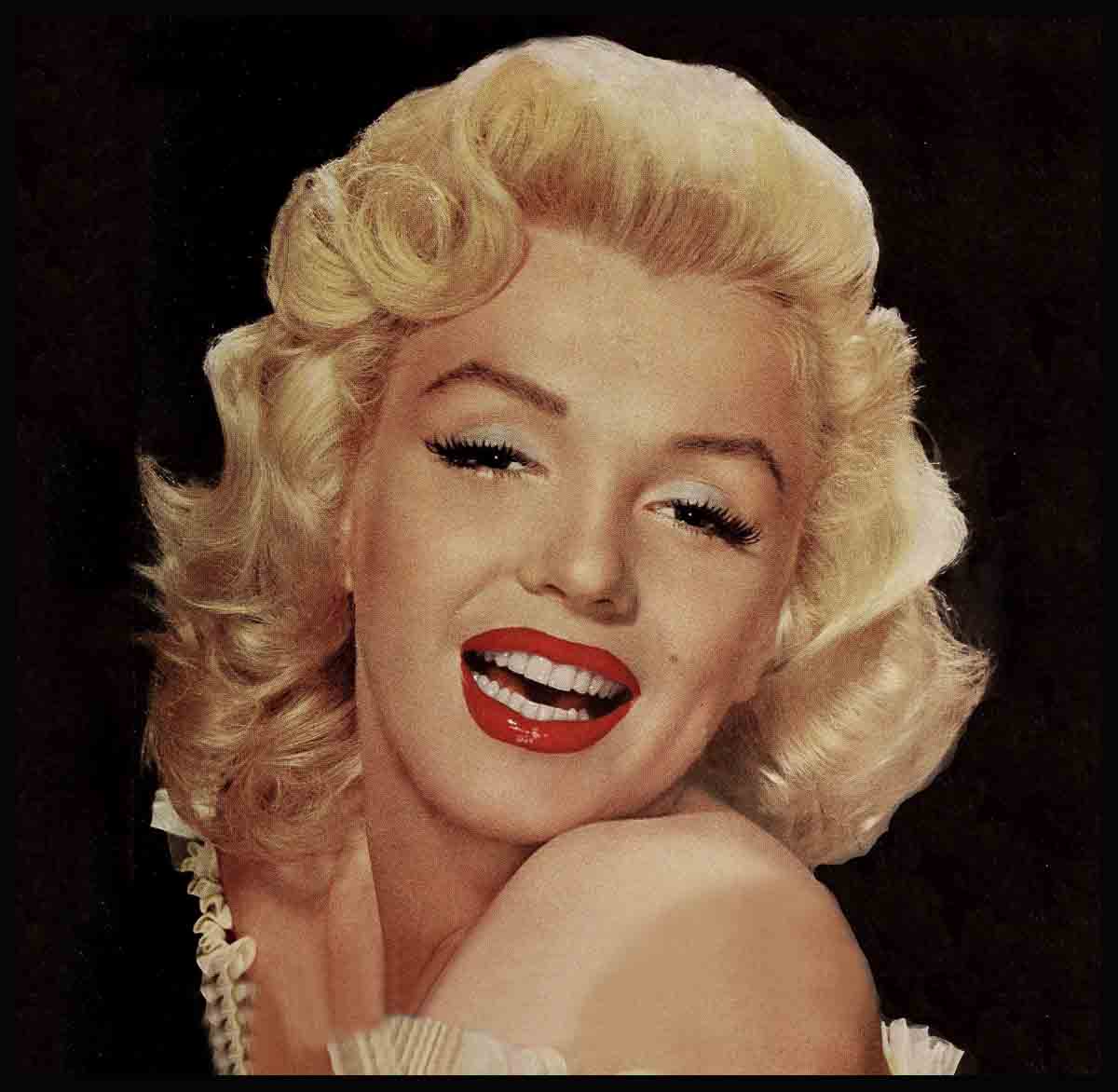
The Lowdown On Hollywood Women
Mr. Charles D. Saxon
Editor,
Modern Screen
261 Fifth Avenue
New York 16, N. Y.
Dear Chuck:
Once upon a time in a Marx Brothers picture, Chico, having a lot of trouble with Harpo, said to him: “I’d like to buy back my introduction to you.”
I’m tempted to say the same thing to you, Chuck, because when you asked me to write an article exposing the Hollywood female, I thought you must be kidding. Who am I to be exposing these lovely creatures? Besides, anyone who tells you he knows all about women is either a fool or a phony, or both. The only thing I know about women is that I don’t—and it took me many years to learn this.
So I’m wising you up fast and cheap, Chuck. I’m a real friend and I don’t like to see you buying an article from me about Hollywood women just because I know Marilyn Monroe so well. After all, Marilyn isn’t the only girl in town.
During my years of covering Hollywood I guess I’ve come to know Lana Turner, Ava Gardner and Joan Crawford, as well as a lot of others among them, maybe better than some of their husbands. It’s part of my job and I learned a long time ago that life is much sweeter if you like what you’re doing.
One of the beauties of my job is that I’m not always aware that I’m working. Take Lana Turner, for instance. When I first knew Lana, she had only one sweater to her frame, and if I had told my readers what I knew about her they wouldn’t have known who I was talking about. It takes every glamour girl a little while to become Somebody. For instance, Chuck, when Lana was in the first flush of her popularity a famous European visited this country, and he asked, “What is a Lana Turner?” It sounded like a gag and it made the newspapers. But it really wasn’t so funny. And what’s more, it isn’t easy to answer.
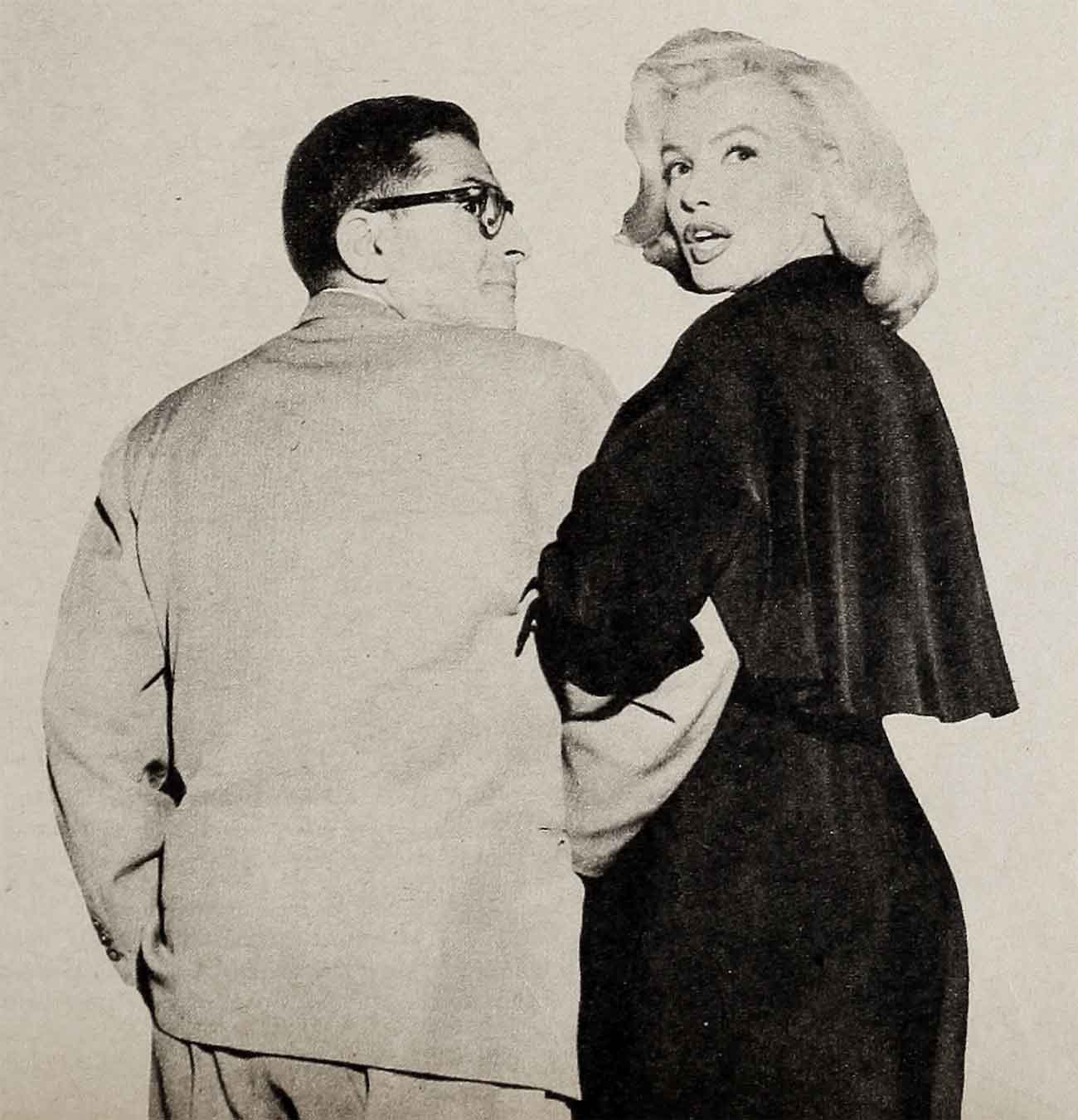
If I really intended to expose Hollywood females for MODERN SCREEN, I’d have to explain that a long time ago I was well acquainted with Lana’s best friend Zelma, who worked in the studio publicity department. Zelma lived only a few doors from Schwab’s drugstore, my real home. And it happened that I had a friend in Zelma’s apartment house who shared her telephone party line. It was only natural that while visiting my friend I’d pick up the telephone and find myself in the middle of Zelma’s conversations with Lana. Normally, I’m not the sneaky type, but a sort of paralysis would set in, and I couldn’t put the telephone receiver down. That’s how I happened to learn that Lana was rather fond of a young attorney by the name of Greg Bautzer—and that her mother wasn’t. And I got all the news about Judy Garland and the other MGM kiddies they talked about.
So I could tell you what a Lana Turner is. She is a good kid, for one thing. I’ve seen her pick up the tab often when she was on a date back in the good old days at Sugie’s Tropics restaurant. Frequently, her escorts couldn’t afford to. I’ve watched and listened in on her romances with not only Mr. Bautzer, but with Artie Shaw and a few others. Off the record, let me tell you about Lana, Chuck, but don’t you go printing it. In her romances, Lana has always been the aggressor, even with that Tarzan fellow who is her husband. When Lana decides she wants a man, she goes out and gets him. One night Lana defended her method, saying, “Ever since Eve chased Adam with an apple, women have pursued men—in a way to make men pursue them.” This may be true, but to Lana’s misery it generally happened that her pursuit of a man either made him too sure of her or frightened him away, leaving Lana without the love and affection she sought.
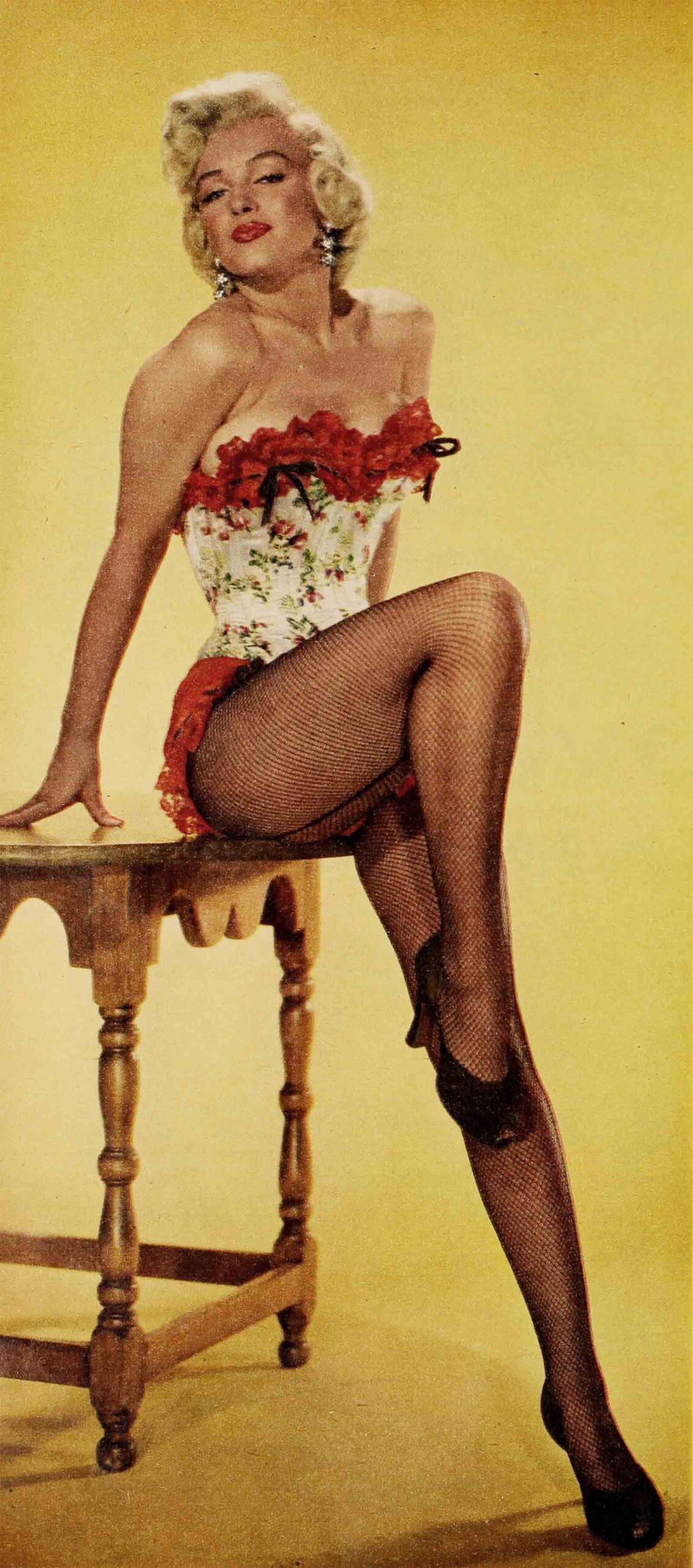
Just between us, the majority of Hollywood females suffer from a common malady—the most beautiful of them and the most glamorous became actresses because they wanted to be loved. Maybe if you printed that they’d be offended, but it’s the truth.
Marilyn Monroe admits it. She told me only recently that she realized the basic reason she became an actress was she was seeking a love she never got from her parents. “I didn’t go into movies,” Marilyn explained, “to make money. I wanted to become famous so that everyone would like me, and I’d be surrounded with love and affection.”
It takes a mighty bright girl to discover a fact like this about herself. On the other hand, dozens of actresses go to psychiatrists to learn that their unhappiness stems from their struggle to find approval in some form—the love of family or the admiration of friends. They learn that their lives are lonely because they depend on applause and the love of an audience to feed their emotional appetites which are hangovers from childhood.
That’s why when anyone says an actress is like the girl next door, I want to laugh. No matter how hard they might try to be ordinary, actresses are different. This was brought out in the movie, All About Eve. One of the characters had a speech which went something like this: “Once in a while somebody writes an article saying that actors and actresses are just like other people. We’re not. It’s because we’re not that we are actors and actresses.”
See what I got into with this little letter trying to explain why I can’t do a piece for MODERN SCREEN exposing the Hollywood female? First thing I know you’ll be calling me Sigmund Skolsky. Little did I think I’d ever be discussing females in this manner. I like to be with them and prefer their company to that of males.
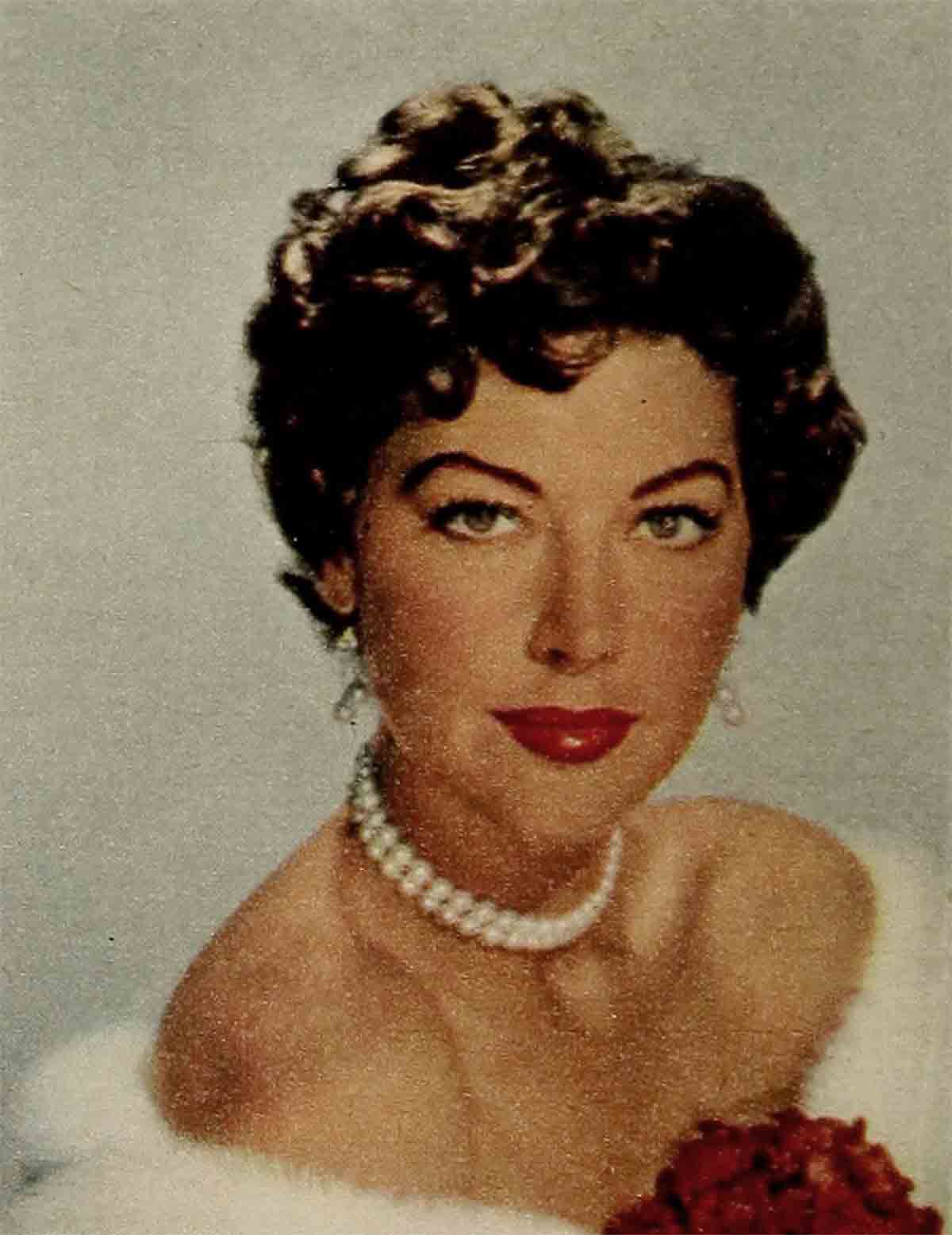
Besides, most actresses are good talkers. Sometimes, though, I manage to get my word in with these gals. Like the time I told Ava Gardner not to worry, she’d be a big movie star. A fellow wouldn’t have had to be very bright to predict this, but in Hollywood such a forecast will make you a genius and get you a friend for life.
I gave Ava this pearl of wisdom while she was a nobody divorcing Mickey Rooney. Ava lived over on Fountain Avenue, also close by my residence at Schwab’s drugstore, with her friend, Peggy Maley. Now, there’s a character! Peggy is the blonde, you remember, who made the front pages a few years ago when she toured Buckingham Palace and stepped out of line to have herself photographed sitting on the throne. Peggy is featured in Marlon Brando’s new film The Wild One and could provide plenty of copy.
Well, Ava had a stock contract at MGM at the time and was actually afraid that the studio would keep her only so another studio wouldn’t cash in on the Mickey Rooney name. She was a scared chick. I used to go over to her place, sit on the floor and play gin rummy until the early hours of the morning. I’d listen to her, look at her and blitz her.
Ava has much in common with Lana. They’re very buddy-buddy. Their taste in men is often alike, and they both go after what they want when shopping for emotional response in men. The difference is that after Ava makes her conquest, that’s it until the roof falls in. The fun for her is in the chase, after which she becomes almost a peasant-type, one-man woman, and puts up with an almost endless amount of grief before she will admit the failure of a romance or a marriage.
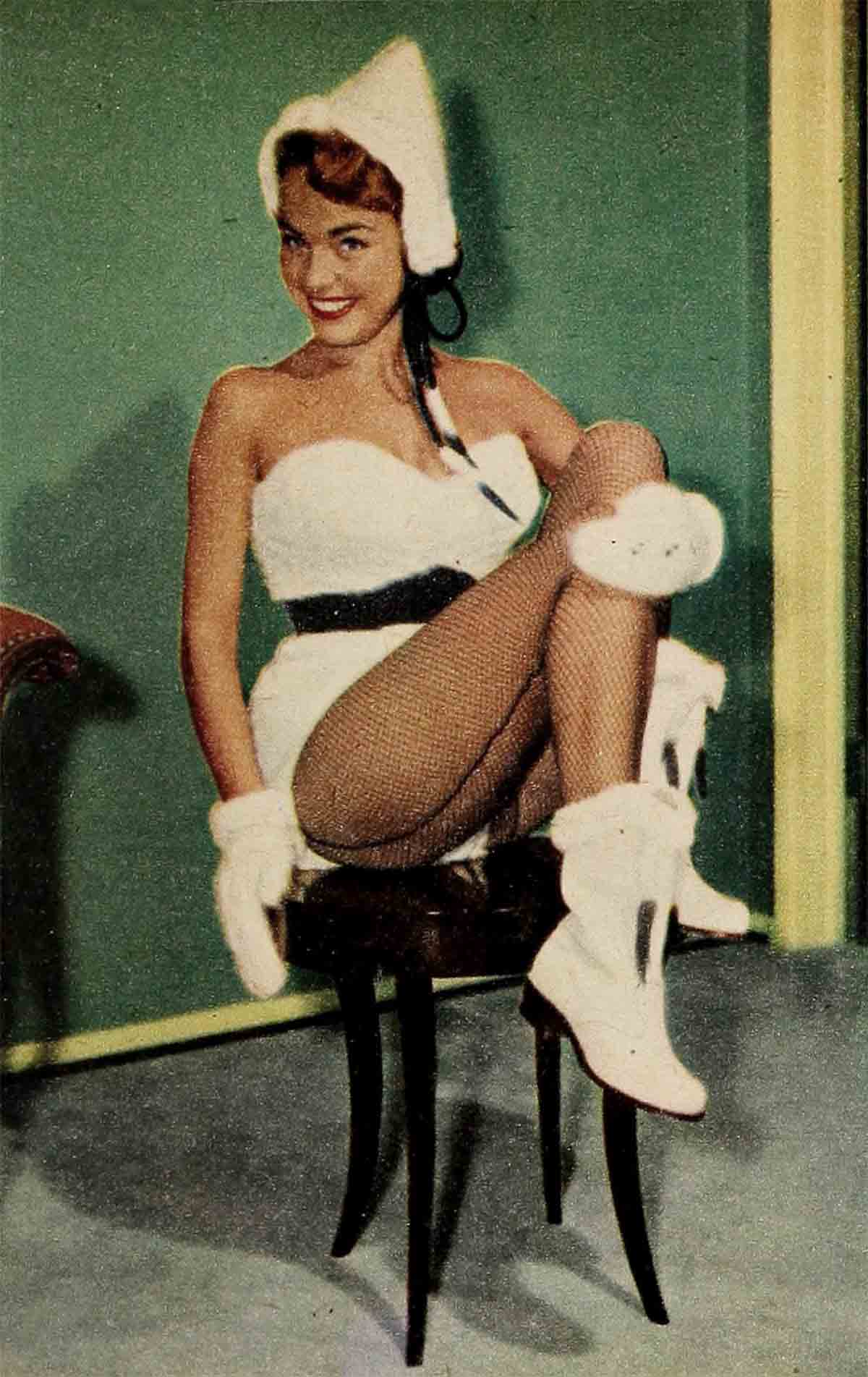
Lana and Ava are both ex-wives of Artie Shaw. As if this didn’t give them enough in common, Lana, you recall, went with Frank Sinatra for about a verse and two choruses. Ava’s marriage to Artie Shaw was a real jam session. Artie was always urging her to read a book, smarten up. Then, late one afternoon, Artie returned to their apartment and found Ava proudly curled up with a real book, Forever Amber. Artie grabbed it from her, hurled it across the room and shouted, “How can you read such junk?”
Artie’s next wife was Kathleen Winsor, the author of Forever Amber. A few years later, Ava told me that the incident, coupled with Artie’s marriage, helped her to regain her composure after the shattering effect of their divorce.
Of course Ava went right on to stardom, which makes me a great man with a crystal ball. She had some other romances, climaxed by her marriage to Frankie Sinatra. You’ll have to admit, Chuck, that in her latest breakup with Frankie she has conducted herself in a fashion that approaches real dignity and maturity.
It happens that I was present and a participant, so to speak, with Adlai Stevenson in the first makeup after the first breakup of the Sinatra-Gardner marriage. Ava adores Stevenson’s blue eyes and wouldn’t stay away from the big political rally, even though she knew Frankie, who was campaigning for Adlai, would be there. Ava gave me the story. I was there when she kissed and made up with Frankie. She also kissed me, and I want to tell you that no actress in Hollywood kisses as hard as Ava. It has the impact of a truck backing into you, and with her, non-smear lipstick smears.
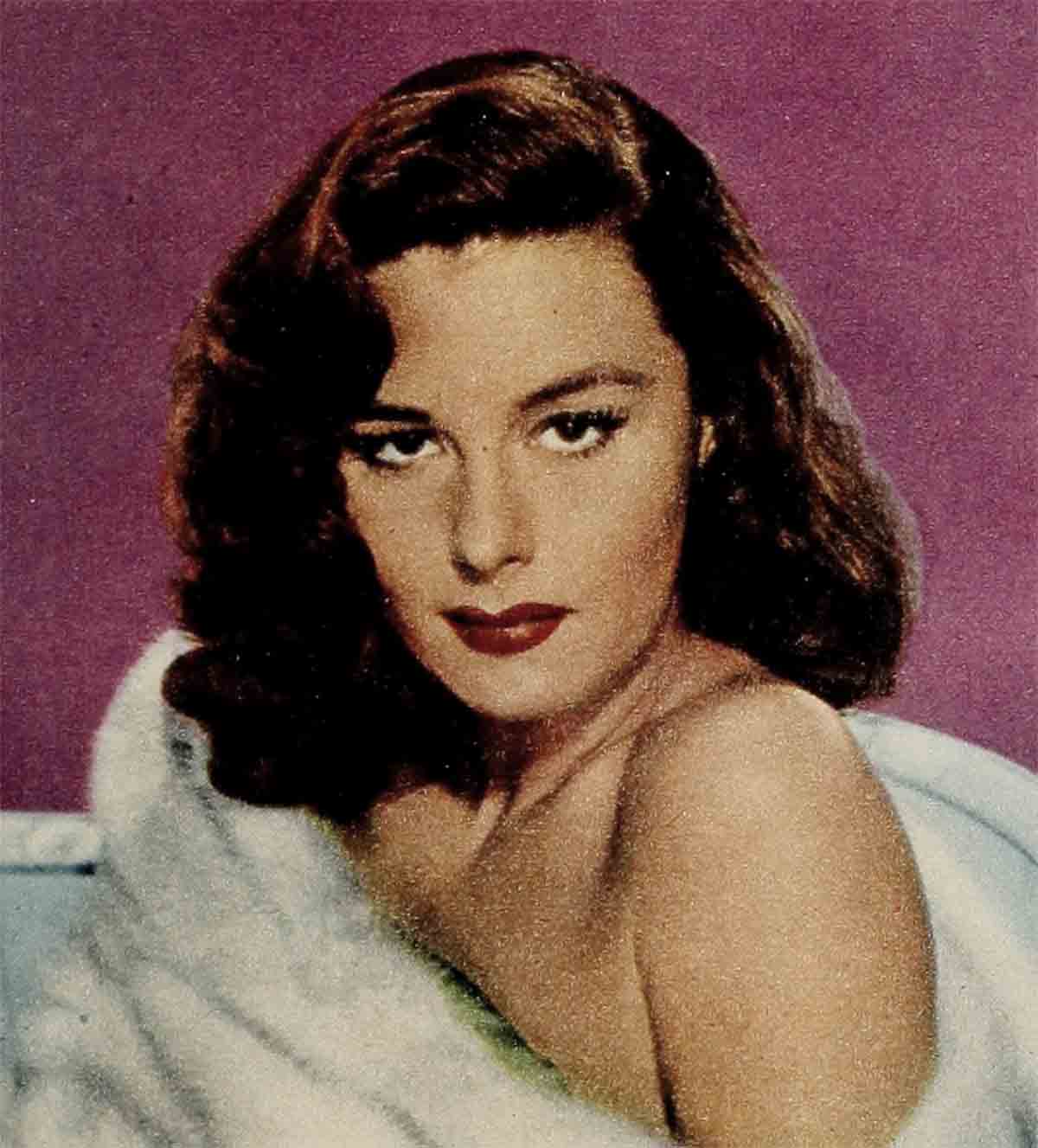
As editor of MODERN SCREEN, Chuck, you have been around actresses for a long time, too, but you aren’t on hand every day to watch them struggle. Statistics and even honest stories in your magazine can’t record the real sweat and tears the effort to stay on top takes from these girls with the angel faces.
How many times have I heard a young unknown actress say she should play the leading role in a current best-selling novel? “I’m the girl!” she declares, and she probably is right. “The author had me in mind when he wrote it.” She sincerely believes this, aware of the fact that you know she has never met the author.
I’ve sat in theatres and watched movies with many struggling actresses and heard them wish they were up there on the screen in the role. When Shelley Winters was a nobody I went to a movie with her. She suddenly pinched me and exclaimed indignantly, “I belong up there! I can play that part better than she does. But nobody will give me a chance!”
That was true at the time, but I knew nothing could stop Shelley. It would be easier to stop Niagara Falls. There is no possible way to halt the drive, determination and singleness of purpose in a Shelley Winters. Sadly, too, there is nothing to be done about the unhappy private lives of these sexy volcanoes while they are in the midst of their struggles. They know what they want and go after it, while at the same time their inner beings struggle desperately to stay normal. Observing these battles, you have a feeling that you should run for the hills. A lot don’t, and they get hurt.
No matter how many people put Shelley on the pan, I always wait to hear Shelley’s side of the story. Mind you, I don’t always say she’s right. But for the most part, I buy Shelley. Most actresses are over-age children. They are using the screen to show themselves off, using their dramatic ability to hold attention and win approval. Shelley made her first appearance when she was five years old, and it was right in line with her present kind of behavior.
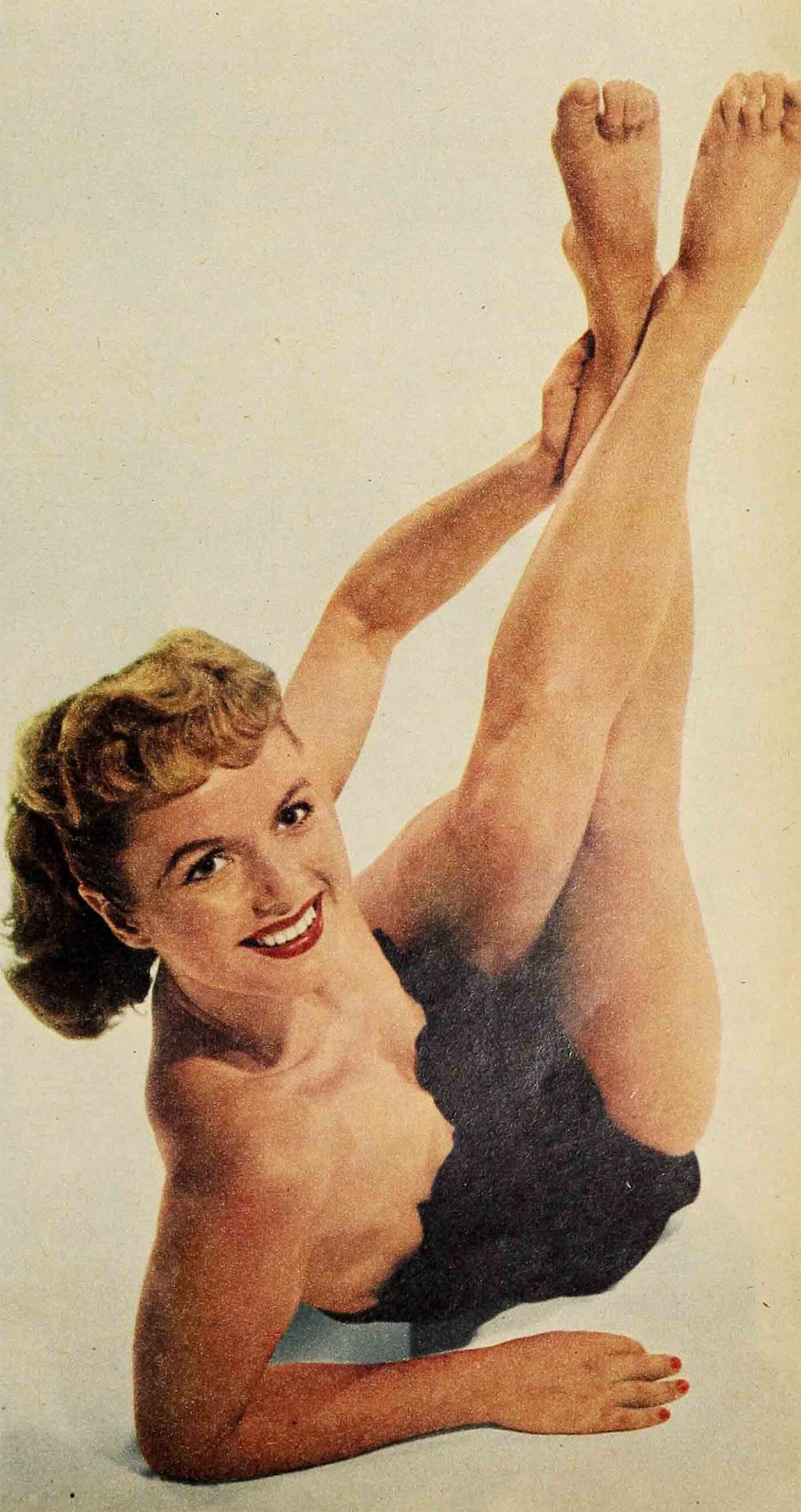
She was taken by her mother to see a vaudeville show in St. Louis. The main act featured an amateur contest. Shelley watched several of the performers and then whispered an excuse to her ma. In a matter of minutes Shelley’s mother was watching her daughter on stage in the amateur contest, singing Shirley Temple’s “On The Good Ship Lollypop.” She finished a chorus, then put her hands on her little hips and yelped to the orchestra leader, “Can’t you play it faster?” He did and she romped through another chorus. Then she took her bow and before the applause could die down she was onstage singing some more. They had to give Shelley a prize to get rid of her. “That taught me something,” Shelley told me. “The louder you do a thing, the better it pays off.” And the only thing in Hollywood that is louder than Shelley is a pair of Van Johnson’s socks.
Now on the private life side, let me tell you what goes with Shelley. Once, long before she had even heard of Vittorio Gassman, whom she married, she went on a date with a fellow by the name of John Hudson who had just come to Hollywood to do his first movie. I joined them in a booth at Googie’s restaurant, along with Director Jerry Epstein. All of a sudden, a stranger in a nearby booth began to make disparaging cracks about Shelley, both as an actress and as a person. We all ignored the fellow up to a point. When he went past it, Jerry said to him, “Why don’t you keep quiet?”
This was all the guy needed. He hauled off and punched Jerry in the nose and then picked up a table knife. Johnny Hudson stepped in with his face carefully averted because he didn’t want his career ruined before it started. It was a comic sight and I had to laugh. The knives at Googie’s would have a tough time cutting butter.
After it was all over, Shelley invited us to her hilltop house where she gave Jerry a glass of wine to calm his nerves. After that she sat on the floor and proceeded to demonstrate how she had played the role of Billie Dawn in Born Yesterday in summer stock. Mr. Hudson read the leading man’s part and the party broke up around four in the morning.
When I woke up in my own bed around noon, I reached for the morning newspapers and there was a full front-page story with all the details. An unknown assailant had pulled a knife on Shelley. So I called her and asked if she had seen the papers. Had she seen them? She had given out the story before she went to sleep! She honestly believes that the worst thing in the world is a secret about Shelley Winters.
On the other hand, Chuck, you editors of MODERN SCREEN have had plenty of experience with the exceptions among actresses. You recall the time your photographers went over to Elizabeth Taylor’s house and managed to put a sweater on her while an editor kept mama upstairs engaged in conversation. And how Liz, who had not yet experienced her first romance turned to photographer Bob Beerman and said, taking a deep breath and filling out the sweater, “What sort of an expression do you want on my face—like I’m waiting for time to go by?” That should have been the tip-off right then. Liz was and is more interested in her personal emotional life than she is in being a big movie star. Maybe she’ll change, but I doubt it.
Women seldom change from the form into which they are molded in the beginning. Take Terry Moore. She told me: “Ever since I was four years old I have wanted to be an actress. Like some girls want to marry a millionaire, I wanted to be a movie star. Not for money and not for love. I did it because I wanted to express myself. I’ve got all the love I can use in my young life.”
And how this young lady expresses herself! She believes not only that one picture is worth a thousand words, but she believes that one sexy picture is worth thousands of words in a movie contract. Terry started out by playing sweet little girls, but she didn’t really get anywhere until she turned sexy. This got her the role in Come Back, Little Sheba, and an Academy Award nomination. When people commented on how she changed by acquiring sex appeal, Terry replied, “I’ve always been the same. I guess it’s just how you sell it.”
To draw a significant comparison, Terry works as hard as Shelley Winters at the career game, but without being as bombastic, and by curbing the frankness which can get a girl in a jam. Terry hears about new pictures before they are written; she visits producers and directors and flatters them. She can call every photographer covering night clubs by his first name. Terry is hep. She’s not afraid to argue with a reporter, but she will always leave him loving her.
Not long ago, I asked Terry if she’d give up her career for marriage. She looked at me as though I’d said something obscene. She explained that today’s woman can mix marriage and a career successfully, and that if a man truly loved her he wouldn’t want her to stop acting. “I want,” she said blandly, “to be swept off my feet by a man I can dominate!”
Yet, with all this concentration on self, Terry can take a look around at her sister stars and admit that they have class, too. “Little Debbie Reynolds,” she says, “is one of my best friends, if not my best. And I admire the way she usually gets what she wants. She is a born leader. She was a leader in the Girl Scouts, and she is a leader now. When our crowd gets together, we find ourselves going where and doing what Debbie suggests.”
I told Terry I had never suspected this of Debbie. “Of course not,” Terry retorted. “That’s why it’s so wonderful. Debbie’s ambition is looked upon as enthusiasm, pep, youthfulness. I’ve often told Debbie I wished I had her qualities.”
I could hardly keep from smiling, listening to Terry on this “youth” bit. She went on to tell me that Debbie knows exactly what she wants, professionally. She said that Debbie’s goal is to become another Lucille Ball. “And that Debbie won’t miss,” Terry continued. “She’s a strong character. Once she wanted to go to a premiere real bad. Bob Wagner had phoned her to invite her that very afternoon. But as much as Debbie wanted to go, as much as it meant to her, she turned Bob down to teach him a lesson for calling so late. I admire her for it. I couldn’t have done it.”
You see the type of stories I’m liable to start telling if I ever do a piece for you exposing the Hollywood Female. Mr. Editor? While I’m at it, let me ask you another question. You’ve been to Hollywood, Chuck. Did you ever try to romance a movie actress? (If your wife is lookining over your shoulder, don’t answer that.) If you have tried, you probably understand why so many movie romances don’t last. You understand the behavior of a Jane Powell or a Rita Hayworth.
This is what a man is up against when he starts a romance with any actress, from Debbie Reynolds to Joan Crawford. The minute an actress comes to the studio, she is pampered and catered to. No queen in history ever had it so good as a movie queen. There’s a wardrobe woman to hand her all her clothes. There’s a makeup man to powder her face. There’s an assistant director to run and get her a container of coffee, somebody else to answer her telephone. The director is courteous no matter how sore he might have been about yesterday’s temperament, and these are only the heads of the big parade of people who start to compliment her at seven in the morning and don’t stop until six in the evening.
It’s pretty tough, as a result, for a movie queen to go home and be treated like a civilian. The gal’s got to be supremely well-adjusted and smarter than a psychiatrist to pull the big switch and start bowing down to just one lone male to whom she happens to be married.
Sooner or later that male ego is going to explode and then there’s real trouble. But how can you hold the interest of an Elaine Stewart, for instance, when she’s used to seeing herself on the screen five times as big as she really is? No offense to Elaine. She can’t help it. She’s going to be even bigger. So are a lot of others. With CinemaScope they’re all going to be bigger than ever and maybe even more difficult to get along with.
Now, you take our girl Marilyn Monroe. I include you in this, Chuck, because of the cover picture of her that you requested for this issue of MODERN SCREEN. As you suggested, I asked her if she’d pose for it and she was pleased. I even went over to the gallery to watch the job being done.
The posing started at twelve-thirty and was still going on at a little past four P.M. “when I left. I was tired just from watching. Maybe your readers would like to know that when you see a photograph of Marilyn or any other actress on a cover it isn’t just a case of “hold it, honey” and “thank you very much—that’s all.” To illustrate, Marilyn brought along her favorite hairdresser, Gladys, and her own make-up man, Whitey. She wanted to look her best and these efficient people understand her. Marilyn made several costume changes to get exactly the right pose for MODERN SCREEN’s cover and when I told her I never realized how much trouble a thing like this was, she said, “I act when I’m posing. Just as hard as I do when I’m playing a role in front of a movie camera. I think of something for each pose so I’ll have the right expression.” (I don’t know what she was thinking of for this cover, but wow!)
I know what Marilyn said is true. When Marilyn is making a picture, she doesn’t care to go out. She often forgets to eat and she completely forgets such practical things as time and money. She is almost things as time and money. She is almost in a trance. Let me give you a for instance:
She telephoned Schwab’s to send over some toothpaste, face cream, etc. By the time the boy arrived, Marilyn had forgotten all about it. She was surprised to see him, but she took the package, looked at the bill which amounted to $7.95 and said, “Wait a minute, Ill give you a check.”
When the delivery boy returned to the store, Leon Schwab looked at the check and said to him, “What’s this? The tab is $7.95 and the check is for $2. 50. What happened?”
The boy said, “I’m sorry. I never looked at the check. I couldn’t take my eyes off Miss Monroe.”
So he had to go back for another look and another check. Marilyn told me that when all this happened she was reading a new script and there was a line in it about two dollars and fifty cents. So she wrote the check out for that amount, naturally.
She just never wants to get out of her dream world. And this place called Hollywood is a dream world for the girls who come here and for those who don’t. It will always be that way in spite of the nightmares most of our Hollywood females go through, sooner or later, even though these nightmares are public gossip.
Need I say more, Chuck? I hope that you will finally get it through your head that I would rather write you a letter like this than to try to sell you a story for MODERN SCREEN. Exposing the Hollywood female, my hat! If I tried to sit down at my typewriter and come off with anything like that I’d tense up and hand you a mess of wordage that would wind up with the tons of publicity copy you receive every day—right in the wastebasket. I’m sorry I goofed, but then who cares about money? And who could expect me to sit alone at my desk figuring out words about Hollywood females when I can be out on the town with one of the real live articles?
Sincerely,
Sidney Skolsky
Editor’s Note: With no apology to our readers, we publish Mr. Skolsky’s letter. Only next time we hope he will put enough postage on his letter. An editor has to complain about something!
THE END
It is a quote. MODERN SCREEN MAGAZINE MARCH 1954





No Comments